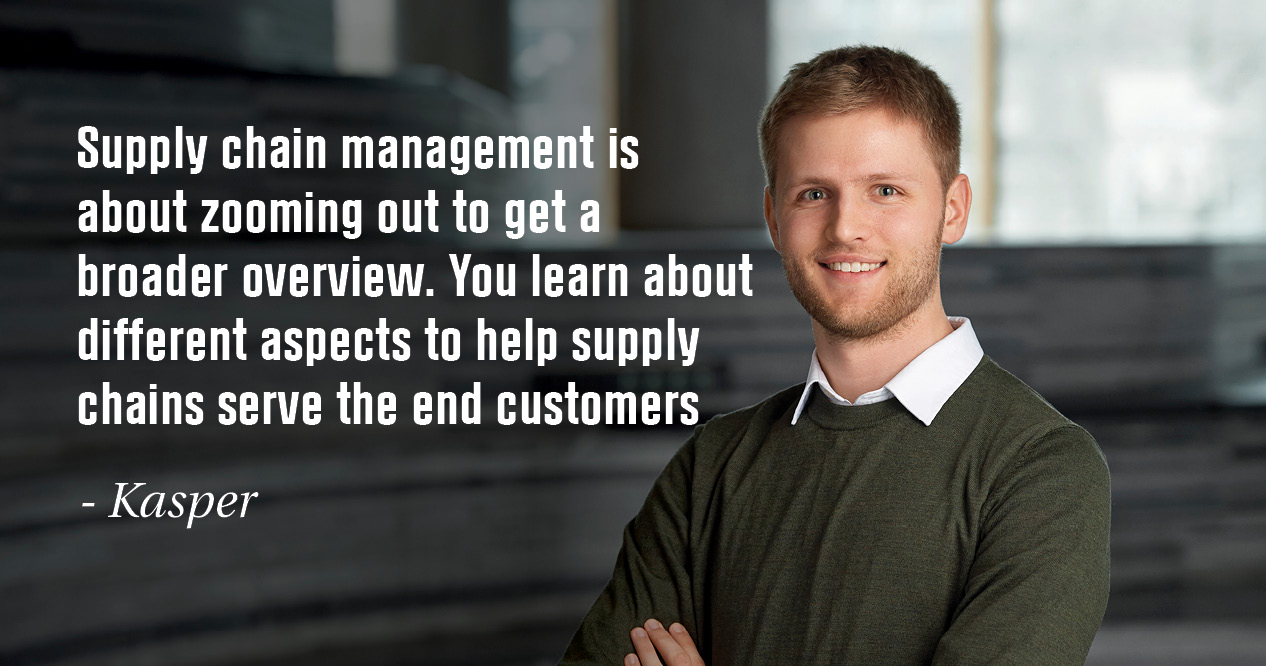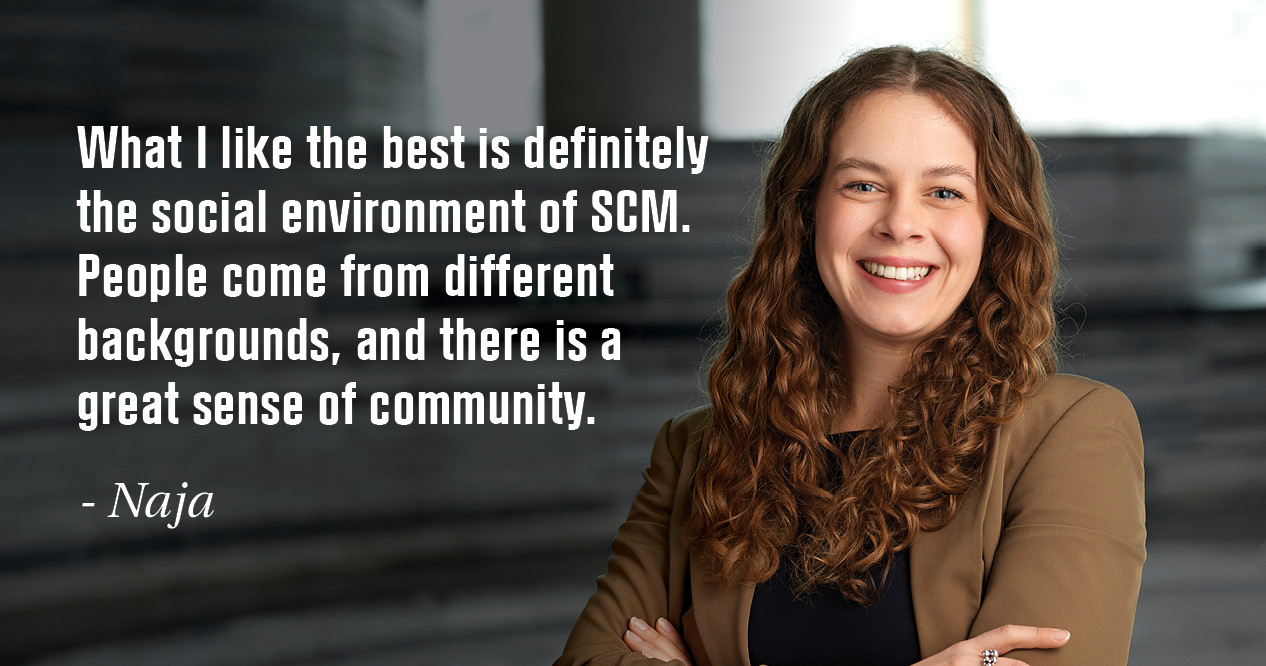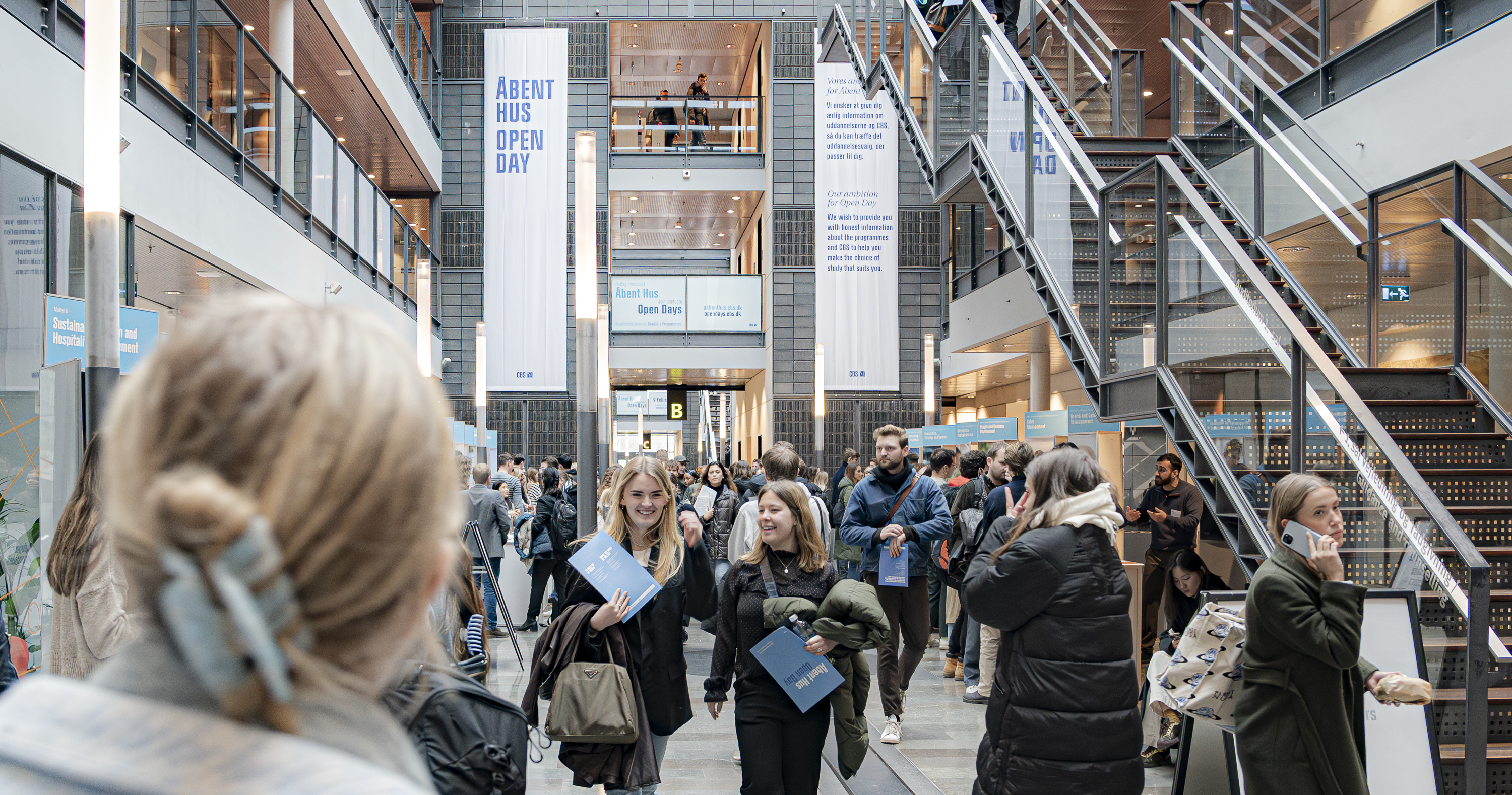The SCM program provides students with theoretical knowledge, tools, techniques, and methodologies that make them capable of analysing and managing global supply chains and operations in a holistic perspective. The programme enables future managers to consider the consequences of decision making and implementation from raw material extraction, production, wholesale, retailing to final consumption as well as the return flow of goods.
Students learn how to find the right “fit” between an organisation’s competitive strategy, its domestic and international operations and the supply chain strategy that leads to implementation in business practice. Furthermore, students learn about the importance of building collaborative relationships internally in the organisation and externally by orchestrating decisions with other players in the supply chain.
This ensures that value creation is coordinated across the end-to-end network the organisation is embedded in. Ultimately, students are enabled to drive and maintain the brand, value and ultimately the overall profitability and success of organisations.
Your knowledge of concepts, theories and models will enable you to analyse data and evaluate the effect of changes in supply chains. The ability to match demand and supply and to have the right product at the right time in the right place is central to the programme, and essential for the profitability and value creation in organisations.
During the programme, you have various opportunities to create your own academic profile.
Electives
On the 3rd semester, you can choose to study courses of your specific interest. CBS offers a large number of electives within a wide range of topics. You can also choose to take electives at other Danish universities. The electives you choose have to be relevant for your programme.
See the current selection of CBS electives on Single courses and electives - Master
Minor
On the 3rd semester, you can also choose to study a so-called minor. A minor is a package of electives within a specific academic area. Typically, it consists of 3 courses. By taking a minor, you strengthen your competences within a specific area of interest, and you can use it to qualify for specific jobs or industries.
See the current selection of CBS minors on Minors
Exchange
Many students choose to go on exchange on their 3rd semester; usually at one of CBS’ more than 300 partner universities. When you go on exchange through CBS, you do not have to pay for the teaching at the foreign university (with a few exceptions), and you can bring your SU (student grant).
Find a list of all CBS partner universities here
Academic internship
You can choose to replace some of your electives with a so-called academic internship. The academic internship consists of an internship period at a company, which is then completed with a project report. You can do the internship at a company in Denmark or abroad.
When doing an internship you get the opportunity to relate theory to practice and reflect on the academic training you receive at CBS in a practical setting. Therefore, the project report and work assignments during your internship have to be relevant to your study programme.
CEMS - Master in International Management programme
On Supply Chain Management, you can apply for the CEMS - Master in International Management programme. CEMS MIM is a double degree programme, which gives you the opportunity to add a second degree in international management to your CBS degree. This means that you will get both the MSc degree and the CEMS in International Management degree.
CEMS is a 1-year programme, which you study in combination with your CBS degree in your 3rd and 4th semester. Part of it takes place at one of the other CEMS universities abroad.
Learn more about CEMS / Master in International Management
Master's thesis
Your 2nd year is completed with a master's thesis. You choose the topic you want to write about, which allows you to focus on a specific topic of your interest. Typically, you write your master's thesis with a fellow student.
Conceptual analysis
If you prefer a strong focus on math, you may find it difficult constantly making conceptual analyses, oral presentations and written reports.
Collaborative and international mindset
You’ll be exposed to Danish pedagogical traditions and values on learning, which can be challenging but also exciting to international students. You’ll enjoy the program if you have a collaborative and international mindset, as you will have both quantitative and quantitative courses.
Studying in English
If you do not have a bachelor’s degree taught in English, we recommend that you read more about what to consider before applying for an English taught programme.
Read more about Teaching and literature in English on Teaching and working methods.
At SCM programme, students get to meet and engage in projects with companies from diverse industries. We host special events and activities that are only available to SCM students. These include tailored events to boost students’ competence skills as well as to increase employment opportunities.
Student life at CBS
Studying at CBS is much more than just preparing for and going to classes.
At CBS, there are more than 20,000 students with different backgrounds and nationalities. Teamwork is an essential part of studying at CBS both in classes and in extracurricular activities.
With more than 100 student organisations, you also have plenty of opportunities to engage and connect with students across programmes and classes.
Learn more about the vibrant student life at CBS, the student organisations, and the international environment on Student life.
For internationals
If you are an international student, we have gathered a lot of information about what it is like to be an international student at CBS and how you can prepare for life in Denmark.
Read more on For internationals
Teaching
The SCM has a high degree of student involvement in part because it is a small and tight-knit group.
You will have student presentations, exercises, class discussions, lectures and real life cases.
The SCM highly recommends that students group up with different people on projects to learn from each other’s strengths and knowledge – group work is good practice for the inter-organisational, intercultural and interpersonal skills you will need to manage your future supply chain networks.
Read more on Teaching and working methods.
Exams
This programme has a mix of exam types, such as 24 hour home assignments, four hours written exam and projects with oral defence.
Read more on Exams at CBS.
Time consumption
You should know that it is demanding to study in a graduate programme, and both the curriculum and workload is significantly higher than at bachelor level.
If you are studying on a full-time graduate programme, you should expect spending approximately 37 hours on average on your studies each week. The workload will vary during the year.
The time leading up to assignment submissions and exams can be hectic, and you can easily work more than 40 hours a week in this period. Preparing for oral exams can be especially time consuming, because you have to be able to explain and discuss the covered concepts and theories and learn things by heart.
Read more on Teaching and working methods.
Student job
Most programmes are quite flexible in terms of combining studies with a student job. Most students work a maximum of 15 hours a week in order to have sufficient time for their studies.
Studying in Denmark - for internationals
If this is your first time studying in Denmark, you may find teaching and exam formats, the grading scale and the academic calendar very different from what you are used to.
Read about everything you need to know as an international student studying at CBS on For internationals > Academic information
What gets you the job?
The programme will teach you problem solving skills to manage a wide range of supply chain issues such as data driven operations in business analytics, decisions and models for supply chain configuration. You will learn about social skills, international operations, and performance management in supply chains and networks. You will acquire the skills to work with actual and current issues faced by companies.
To boost career opportunities, the programme hosts a wide range of events and activities where you get to meet potential employers.
You will be able to fill a broad variety of positions. Your understanding of global supply chains means that you can enter any link in a supply chain and design, manage and optimise it. You will have both ready-to-use knowledge, specialised knowledge and strategic understanding, which is a rare combination for a specialist graduate.
The combination of quantitative and qualitative approaches bridge the gap between soft (behavioral, qualitative) and hard (mathematical, analytical) skills, when considering future working-life competencies for supply chain professionals.
Career opportunities
Graduates in SCM work with analysis in corporations or consultancies, strategic elements of SCM, process integration and optimisation. You can also work with development of new service solutions and business models, improvement in sustainability and resilience. Implementation of purchasing and procurement strategies are also among the exciting career opportunities. Students with SCM formation and education are well sought after by nearly all sectors:
• logistics services
• transportation
• humanitarian logistics
• information technology
• artificial intelligence
• healthcare
• energy
• consulting
• banking
• retail
• government
• NGOs
• Recycling
Some of the professional titles of graduates in SCM, such as those from our alumni are:
• Chief Supply Chain Officer
• Chief Operations Officer
• Director of Global Logistics and Operation
• Group Logistics Director
• Director of Strategic Sourcing
• Chief of Procurement
• Head of Global Supply Chain and S&OP
• Vice President of Global Supply Chain
• Head of Supply Chain Optimisation
Competence profile
In the academic profile you can find more information about the various competences you achieve on the programme:
Competence profile for SCM
Supply Chain Management is also offered as a part-time master (erhvervskandidat). The part-time master is a 4 year programme with 8 semesters of each 15 ECTS per semester. This allows you to have more time to work besides your studies.
To qualifiy for the part time programme you must meet the same entry requirements as the full-time programme, AND have relevant employment, and work a minimum of 25 hours a week.
You can find more information about the part time programme here.










